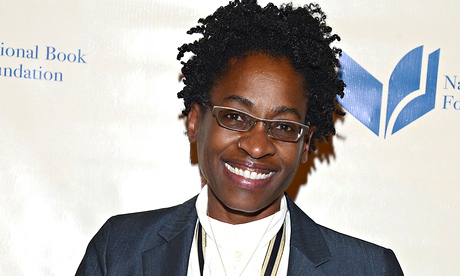
The African American children’s author Jacqueline Woodson has said that Daniel Handler’s “wink-nudge joke about being black” at the National Book Awards “came from a place of ignorance” and was “making light” of a “deep and troubled history”.
Handler, presenting Woodson with the prize for young people’s literature for her poetic memoir Brown Girl Dreaming, said last month that: “Jackie Woodson is allergic to watermelon. Just let that sink in your minds.” His remarks were widely criticised, and Handler – who writes the hit Lemony Snicket series of children’s books – later apologised, describing the comments as “monstrously inappropriate and yes, racist”, and donating $110,000 to the We Need Diverse Books campaign for diversity in children’s literature.
Woodson has, until now, not commented about the controversy, telling the Guardian last week: “I’m trying to figure out how to think about it”.
But now, in a lengthy essay in the New York Times this weekend, she lays out her response to the remarks from Handler, with whom, she says, she has been “friends for years”.
“Last summer, at his home on Cape Cod, he served watermelon soup and I let him know I was allergic to the fruit. I was astonished when he brought this up before the National Book Award audience – in the form of a wink-nudge joke about being black,” she writes. “In a few short words, the audience and I were asked to take a step back from everything I’ve ever written, a step back from the power and meaning of the National Book Award, lest we forget, lest I forget, where I came from. By making light of that deep and troubled history, he showed that he believed we were at a point where we could laugh about it all. His historical context, unlike my own, came from a place of ignorance.”
Woodson says she was allergic to watermelon by the age of 11, at which point she had “seen the racist representations associated with African Americans and watermelons, heard the terrifying stories of black men being lynched with watermelons hanging around them.”
“The hideousness of the stereotype began to sink in. In the eyes of those who told and repeated the jokes, we were shuffling, googly-eyed and lesser than,” she writes.
She wrote her memoir, Brown Girl Dreaming, the story of her family from slavery through civil rights until her childhood in the 1970s, as part of a mission which she said has been passed down to her “to write stories that have been historically absent in this country’s body of literature, to create mirrors for the people who so rarely see themselves inside contemporary fiction, and windows for those who think we are no more than the stereotypes they’re so afraid of”.
She wrote it, her essay finishes, “to give young people – and all people – a sense of this country’s brilliant and brutal history, so that no one ever thinks they can walk onto a stage one evening and laugh at another’s too often painful past”.

